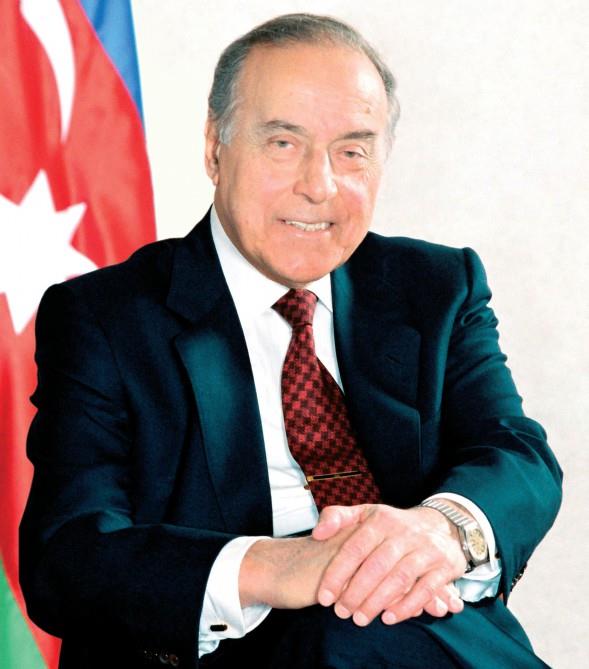
Heydar Alirza oglu Aliyev was born on 10 May 1923 in the city of Nakhchivan of Azerbaijan. In 1939, after graduating from the Nakhchivan Pedagogical School he studied at the architectural department of the Azerbaijan Industrial Institute (now the Azerbaijan State Oil Academy). The incipient war impeded to complete his education.
Since 1941, Heydar Aliyev heads the department at the People Commissariat of Internal Affairs of Nakhchivan ASSR and in 1944 was sent to work at the state security bodies. Heydar Aliyev, working since that time in the security bodies, since 1965 held the post of deputy chairman, and since 1967 — chairman of the Committee of State Security under the Cabinet of Ministers of Azerbaijan Republic, and he was conferred the rank of lieutenant general. In these years, he received special higher education in Leningrad (now St Petersburg), and in 1957, he graduated from the history department of Azerbaijan State University.
Being elected at the Plenum of the Central Committee of the Communist Party of Azerbaijan in July 1969 as the First Secretary of the Central Committee of the Communist Party of Azerbaijan, Heydar Aliyev heads the Republic. In December 1982, Heydar Aliyev has been elected as an Alternate member of the Politburo of the Central Committee of the Communist Party of the Soviet Union, and appointed at the post of the First Deputy Chairman of the Cabinet of Ministers of the USSR and became one of the leaders of the USSR. During twenty years, Heydar Aliyev was the Deputy of the Supreme Soviet of the USSR and for five years was Deputy Chairman of the Supreme Soviet of the USSR.
In October 1987, Heydar Aliyev, as a sign of protest against the policy pursued by Politburo of the Central Committee of the Communist Party of the Soviet Union and personally the Secretary-General Michael Gorbachev, resigned from his post.
Inbound with the tragedy, committed on 20 January 1990 in Baku by the Soviet troops, appearing on the next day at the Azerbaijan Representation in Moscow with a statement, demanded to punish the organizers and executors of the crime, committed against the people of Azerbaijan. As a sign of protest against the hypocritical policy of the leadership of the USSR, in connection with the critical conflict accrued in Nagorny Karabakh, in July 1991, he left the Communist Party of the Soviet Union.
By return in July 1990 to Azerbaijan, Heydar Aliyev has lived at first in Baku, then in Nakhchivan, and in the same year, he was elected as the Deputy to the Supreme Soviet of Azerbaijan. In 1991-1993s, he held the post of Chairman of the Supreme Mejlis of the Nakhchivan Autonomous Republic, Deputy Chairman of the Supreme Soviet of the Republic of Azerbaijan. In 1992, at the constituent congress of the "Yeni Azerbaijan" Party in Nakhchivan, Heydar Aliyev was elected as the Chairman of the Party.
In May-June 1993, when, as the result of extreme tension of the governmental crisis, the country was on the verge of civil war and loss of independence, the people of Azerbaijan demanded to bring to power Heydar Aliyev. The then leaders of Azerbaijan were obliged to officially invite Heydar Aliyev to Baku. On 15 June 1993, Heydar Aliyev was elected as the Chairman of the Supreme Soviet of Azerbaijan, and on 24 July — on the resolution of the Milli Mejlis, he managed to fulfill powers of the President of Azerbaijan Republic.
On October 3, 1993, as the result of nationwide voting, Heydar Aliyev was elected as the President of the Azerbaijan Republic. On October 11, 1998, having garnered at the elections, passed in high activeness of the population, 76,1 percent of the votes, he was re-elected as the President of Azerbaijan Republic. Heydar Aliyev, giving his consent to be nominated as a candidate at the 15 October 2003 presidential elections, Heydar Aliyev relinquished to run at the elections in connection with health problems.
Heydar Aliyev was conferred a number of international awards, the title of an honorary doctor of numerous countries, and other high honors. He was conferred five times with the Lenin Order, the Order of Krasnaya Zvezda, and many medals, and twice Hero of Socialist Labor was awarded by Orders and medals of many foreign states.
The historical destiny of Azerbaijan, covering the period of over the thirty latest years, was inseparably linked with the name of Heydar Aliyev. The revival of the people during these years in all spheres of its socio-political, economic, and cultural life is connected just with his name.
During the said period of his leadership, Heydar Aliyev helped his native land Azerbaijan, the progress that he persistently strived towards, the rich culture, great historical past with which he was proud of, and on the coming generations on whom he was concerned, to overcome as a state heavy and sharp ordeals of time.
Being an outstanding politician and statesmen, indisputable leader of the nation, he was a live legend, and therefore the Heydar Aliyev phenomena always attracted attention, the admiration rising political activity of this nationwide leader of the Azerbaijanis of the world was widely covered both in the Republican and world press.
In June 1993, when the people of Azerbaijan believed that the national statehood was on the edge of fall when there began the hardest days, it insistently demanded a change of the existing power, and since that time relied its destiny on Heydar Aliyev. Heydar Aliyev, seeing the misfortune of his nation, accepted the invitation and returned to great politics in Azerbaijan. The people met the return of Heydar Aliyev with hope and joy, and this day went down the history of independent Azerbaijan as the Day of National Salvation.



